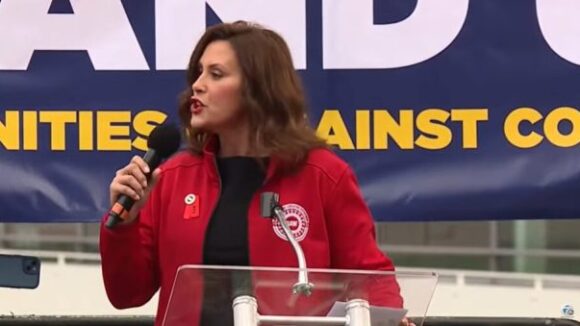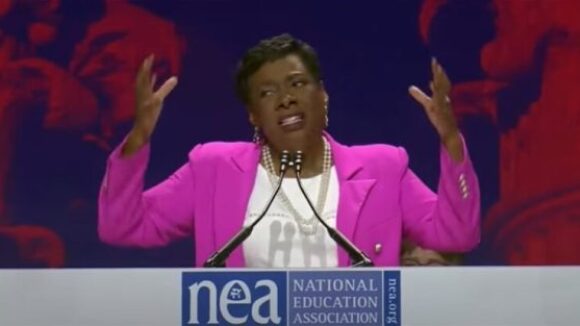Tyranny Triumphs in the Great Lakes State
Ignoring ample evidence of forced unionism’s unfairness and its damaging impact on jobs and incomes, Big Labor Michigan Gov. Gretchen Whitmer signed Right to Work destruction in 2023.

Teamster Retirees in Upstate New York Hit With 29% Pension Cut
In December 2014, Barack Obama signed a measure altering 40 years of labor law, and paving the way for unprecedented cuts in benefits for current retires in troubled multiemployer pension plans (MEPPs).
As of this September, according to an analysis by Baker & Hostetler LLC, 113 MEPPs covering 1.3 million employees and retirees, or 25% of all participants in such plans, had already been found by the U.S. Labor Department to be in “critical and declining” condition.
Under the so-called “Multiemployer Pension Reform Act” (MPRA), rubber-stamped by a “lame-duck” Congress prior to being signed by Mr. Obama, plans that are classified as “critical and declining” are potentially eligible to reduce pension benefits by 30% to 65%.
‘The Question Is When And How They [Benefit Cuts] Are Going to Happen’
In public, union bosses try to disavow responsibility for the MPRA, which was sponsored by then-Congressman George Miller (D-Calif.), a career-long Big Labor politician. But the fact is, the MPRA could never have been adopted without the support of the bosses of multiple unions whose rank-and-file members now face drastic pension benefit cuts.
In fact, the original 2013 blueprint for the MPRA, known as “Solutions, Not Bailouts” (or “SNB”), was heartily endorsed by plumbers union General President William Hite and Tom Nyhan, the executive director of the Teamster Union’s Central States, Southeast & Southwest Areas Pension Fund.
Mr. Nyhan was unapologetic about the fact that the SNB plan would cut retiree benefits sharply:
“We are going — it’s not a question of if there are going to be benefit cuts. There are going to be benefit cuts. The question is when and how they are going to happen.”
Big Labor Job Destruction A Major Cause of Union Retirees’ Predicament
In early August, the New York State Teamsters Conference Pension and Retirement Fund became the third MEPP in the U.S. to receive approval from the Treasury Department to slash benefits for its members.
Consequently, a few weeks later roughly 35,000 forced-dues-paying active and retired Teamsters, mostly residing in upstate New York, faced a Hobson’s choice.
They could cast a vote in favor of most retirees’ losing 29% of their benefits and of active employees’ losing 18% starting as soon as October 1.
Or they could vote potentially to lose half or more of their pension benefits when the grossly underfunded New York State Teamster retirement fund went bankrupt. Managers predicted that, without immediate cuts in benefits, this would happen within a decade.
A key reason why multiple Teamster and many other Big Labor-dominated MEPPs are underfunded is union work rule-induced job destruction, which has cut sharply the number of fund contributors relative to retirees.
In the trucking industry, for example, according to economists Barry Hirsch and David Macpherson, over the past 10 years alone U.S. unionized employment plummeted by nearly 15%, even as union-free employment rose by 6%.
Ultimately, opponents of the cuts fell far short of securing the votes of the majority of plan participants, which under the MPRA was what they needed to prevail.
Of course, many Teamster retirees and active employees are deeply distraught about the outcome.
‘Very Few in the Rank And File Realized What Was Happening’
Even before the vote happened, one retiree quoted by the Albany (N.Y.) Times Union lamented: “I’m going from middle class to poor.”
What makes matters even worse is that, as another news account noted, “very few in the rank and file realized what was happening” until they got a notice from the fund in August 2016.
“New York Teamster pension trustees and other Teamster officials who had access to the books must have been aware there was a grave problem for many years,” said Greg Mourad, vice president of the National Right to Work Committee.
“If Teamster boss-selected pension managers had leveled with future retirees a decade ago, it would at least have given workers time to prepare.
“The gross mismanagement of MEPPs by union bosses and their handpicked trustees is another distressing illustration of just how little union bosses deserve their forced-dues privileges. And of how readily politicians like George Miller will do Big Labor’s bidding, even if unionized workers are the people getting hurt.”

Ignoring ample evidence of forced unionism’s unfairness and its damaging impact on jobs and incomes, Big Labor Michigan Gov. Gretchen Whitmer signed Right to Work destruction in 2023.

Largely thanks to the Right to Work attorney-won U.S. Supreme Court decision in Janus v. AFSCME, union bosses like NEA President Becky Pringle are no longer able to block virtually all meaningful education policy reforms.

Avelo employee Kim Howard believes all the firm’s flight attendants should get to vote on continued AFA rule. Credit: WTNH-TV (ABC,…